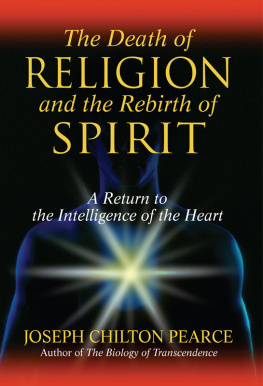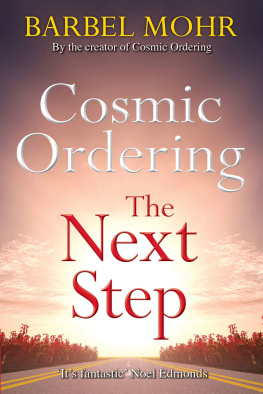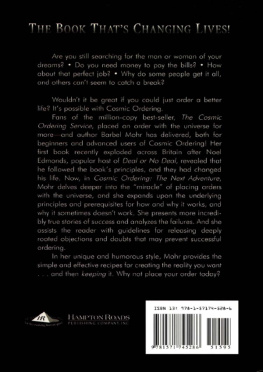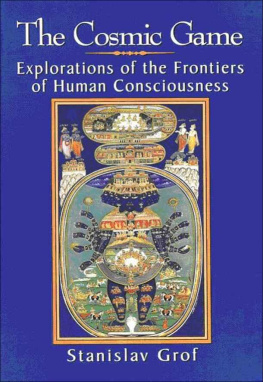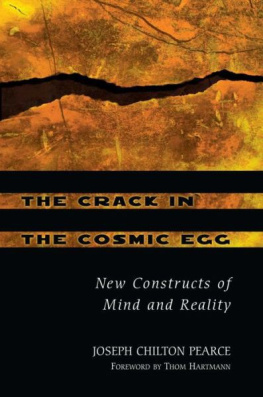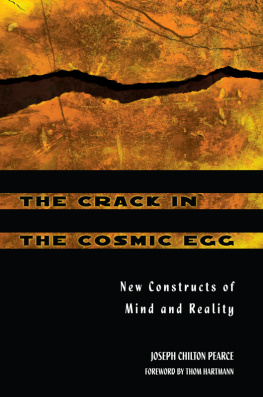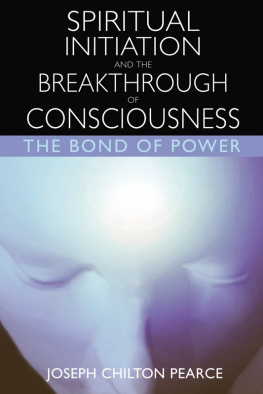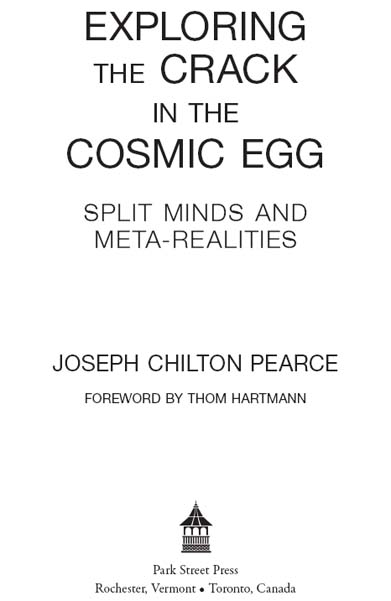for Arthur Ceppos

ACKNOWLEDGMENTS
To George Jaidar I owe my insight into fear as a learned reaction, and though the elaborations are mine, I have borrowed from him the term guilting and the horse and rider analogy. Though my usage is quite different, I have borrowed metaprogramming from John Lillys book, Programming and Metaprogramming in the Human Biocomputer.
My dedication to my publisher speaks for itself. Finally, my gratitude to Karen Hinds for her kindness and assistance, her red-pencil editing, proofreading, and stubborn refusal to let my obscurities pass unchallenged.
FOREWORD
Thom Hartmann
Mankind once knew where the gods wereeverywhere. All of creation was sacred. The fire of life infused everything from the butterfly to the lion to the mountain to the river. We saw the reality as it was, and we knew ourselves as we were.
And then we became civilized. Through the course of this process, we moved the sacred from the world around us and in all of creation to mythical beings in the sky. Then we took those beings and put them in boxes called churches and visited them weekly.
Nowadays, we dont even so much visit the sacred weekly. Everything is to be feared. Even childhood is a disease to be cured.
And all of that is simply meta to ego and culture.
In short, our culture has gone insane.
One of the great chroniclers of our cultural insanity is Joseph Chilton Pearce. A brilliant and insightful expert on everything from medicine to childhood to the nature of life itself, Joseph Chilton Pearce awakens us all.
In this book, he notes that, Our problem is to save ourselves from our saviors. And from there, he shows us how all of the various saviors offered by our society, from science to religion to our culture itself are flawed.
At the core of this f law is our ego, the consequence of our acculturation.
From a very young age, when we have access to our primary process, we begin covering over that process, that access to reality, with story after story, desire after desire, myth after myth that we learn from our culture.
In everything Pearce has explored in his life, and in a variety of books from the early Crack in the Cosmic Egg to later works like Magical Child andThe Biology of Transcendence, he constantly calls to us to awaken to deeper realities and more visceral and heartfelt truths. In Evolutions End,for example, he suggests that the heart is the source of intelligence, whereas the brain is the source of the intellect. Without the intelligence of the heart informing the intellect of the brain, we are not only lost, but in crisis.
Exploring expands on the concepts he first explored in his Crack In the Cosmic Egg.
In Crackhe discussed how his wifes death led him to a series of transcendental experiences that caused him to question what we call reality. In Exploring he takes us a step beyond even that, uncovering the layers we have wrapped around our original processes and that now prevent us from knowing reality.
Pearce acknowledges the usefulness of ego and culture, even as he warns us of believing that they are neither the beginning nor the end. Ultimately, they are tools that can be used to transcend themselves (albeit with considerable difficulty), and thus discover the reality that lies both deeper behind and within each of us.
Joseph Chilton Pearce is the explorers explorer. He has been on a lifelong quest to know what is beyond the next hill, the next boundary, the next layer, the next universe. And so much of that search has been within. Because it is within us, deep within our true processes, within our real wisdom and knowledge, that we find the true nature of ourselves and of creation.
This marvelous book will take you into that journey. Heart and mind, spirit and soul, reality and myth: all dissolve into the oneness that Joseph Chilton Pearce reveals.
Onward, brave explorer!
THOM HARTMANN is the award-winning, bestselling author of over a dozen books, including The Edison Gene, The Last Hours of Ancient Sunlight, and Attention Deficit Disorder: A Different Perception. He is an internationally known speaker on culture and communications and an innovator in the fields of psychiatry, ecology, and democracy. His groundbreaking work in ADD/ADHD and psychotherapy has been featured in TIME magazine, the New York Times,and media around the world. He lives in Oregon.
INTRODUCTION
RADICAL SHIFTS IN VIEWPOINT
In my book The Crack in the Cosmic Egg, I described reality as our semantic creation and explored how our minds could enter into that creation and change it. Accept the arbitrary nature of any reality representation, I argued, risk yourself to the transformation of it, and there are no limits to your creative capacity.
My experience since that writing has both verified Crack and yet forced certain revisions. For instance, what I called autistic thinking in Crack I now call primary process thinking. The reality-adjusted thinking of CrackI now refer to as culturally conditioned thinking. These are not idle metaphoric exchanges, but radical shifts of viewpoint. In Crack, I had failed to grasp certain fundamental principles because of unconsciously accepted cultural assumptions. I was fascinated by the interactions between mind and reality as displayed in metanoia, scientific discovery, spontaneous healings, fire-walking, and other nonordinary phenomena. But I found that signs and wonders did not alter our cultural plight in the least. And I found that while our cosmic egg is our own creation, not a given state, there was a given state, a primary process lying untrammelled beyond the reach of our verbal warp. This I had denied previously.
I found, further, that we created a Crack for ourselves right along with our creation of our egg; that is, our biological development keeps our options open to the given state in spite of our cultural conditioning. Even as we seal ourselves into a word-built world, one function of our intellect breaks that seal and keeps our lines open. These lines lie not so much in our head as in what don Juan (see Carlos Castanedas trilogy on the teaching of don Juan) calls our body-knowing. Again the evidence points toward two distinct modes of thinking, as it did in Crack.
Hans Furth (see bibliography) claims that the human intellect grows through living contact with the environment. This growth will take place even where there is no linguistic system available. Furths observation runs counter to our acculturated beliefs and surely challenges our educational bureaucracy. A child learns by interacting with reality in what I call our primary program. At the same time, however, the child must cope with the overwhelming impingement of cultural processing. I call this acculturation process our metaprogram. This metaprogram is an abstract semantic construct based not on reality interaction but on fear of reality. The child can only react to that fear with anxiety, and erect buffers to it, until he can intellectually create his ownmetaprogram concepts. The ability for abstract conceptual creation opens somewhere around the sixth year of life. The child must devote his new capacity to structuring the cultural semantic reality in order to survive that reality system.


